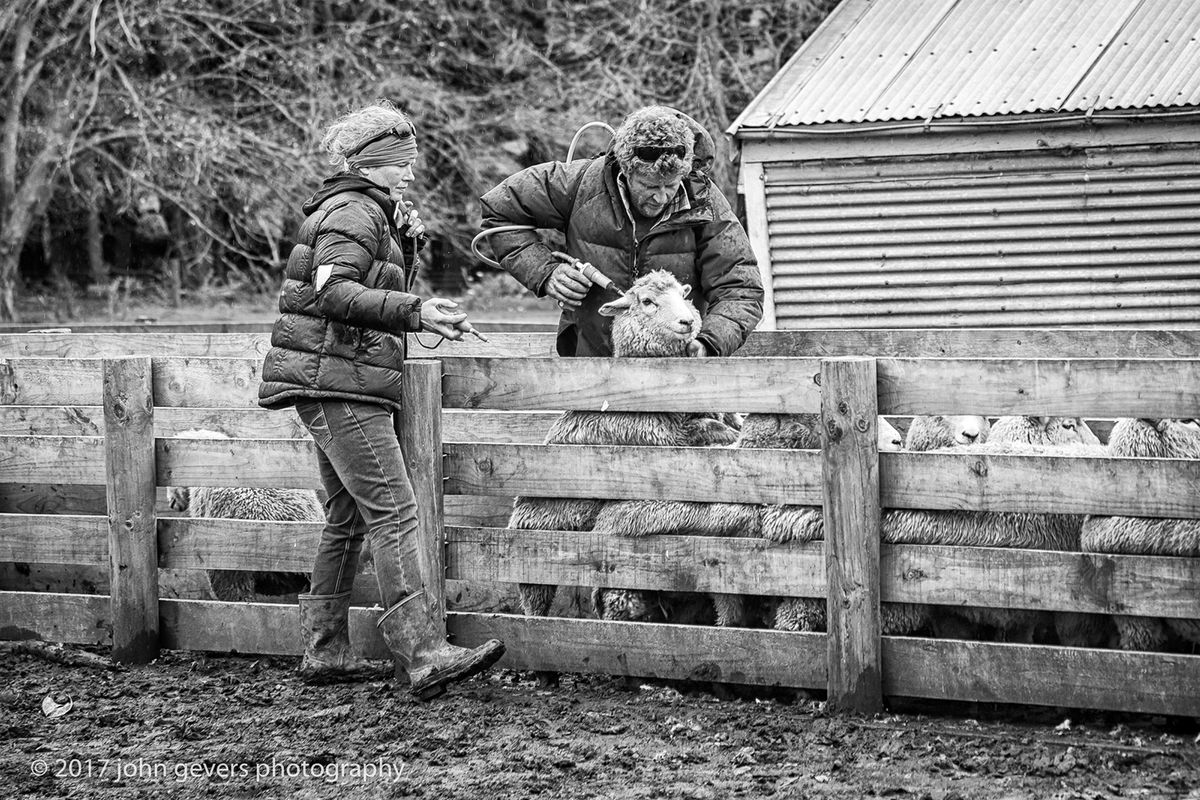
Glenariffe Station • "We best get to the drenching before we get wet."
John Gevers & Kent Deitemeyer
Video of images above illustrates our story below.
Take the road into the Rakaia River Gorge in Canterbury, New Zealand, long past where the asphalt stops and the shingle (gravel) begins, and yellow directional signs for high country sheep stations appear. The braided river runs fast in the spring, fueled by snow melting in the Southern Alps that watch over the valley like a benevolent overlord, white cape draped on stupendously wide shoulders. This is Lord of the Rings territory.
Hardy, tenacious New Zealanders work this rugged land, thousands of acres in each steeply raked station. It’s here that Romney and Merino sheep are raised for wool and protein: the longtime mainstays of agricultural pursuits in this land slung low in the South Pacific. Some Rakaia farmers have added cattle to the mix, but for the most part, it’s sheep that dot the wall-calendar landscape.
By the time we’re upon the lichen-rimmed delivery box along the road for Glenariffe Station, more than 40 kilometres (25 miles) of shingle has seen our Honda 4x4's undercarriage. Frequent fords require slowing down to traverse the rushing water. It’s all part of getting into this soul-stirring part of the South Island.
Life in the Gorge requires more than tenacity from the sturdy families who pass these stations down from generation to generation. The remote high country life carves human souls into fine, hospitable stock who seem a bit more aware of the joy and exhilaration that comes from living quick to the precariousness that life on earth can be.
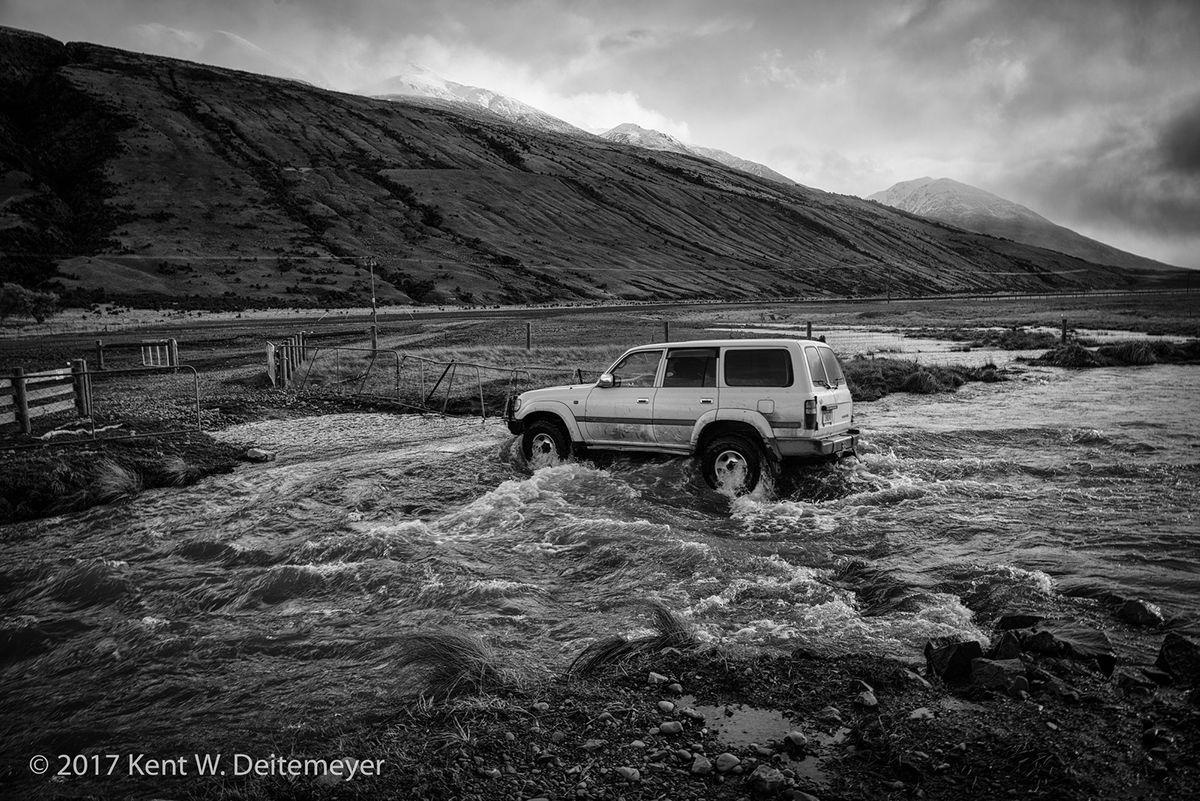
We turn down the lane leading to Glenariffe Station only to be stopped by the alpine snow melt rushing a bit too swiftly and deeply for our rather timid 4x4. We’ve driven two hours from Christchurch to visit — only now to be defeated by the final ford leading to the farmstead. There once was a bridge here, but resources needed elsewhere on the farm prevent replacement. We can see the house and farm buildings from the edge of the ford, but we’re on the wrong side of the tracks.
There’s no cell signal in this part of the country, so we can’t call the husband-wife team who keep Glenariffe humming along. Blowing our horn and shouting might get someone’s attention up the hill, but the rushing water would likely drown the sound out. Besides, the farmers are likely out somewhere in their 2000 acres working with the Romneys or moving electric fencing from one paddock to another.
Mark Ensor and BJ Bull are the current members of the Ensor family in charge of the 100-year-old family farm. Mark stopped work on his PhD in Economics when his father, Alastair, called to inquire about his son’s interest in coming back home to farm. It’s Mark and BJ who now care for 4500 sheep, along with two adorable towheads of the human variety.
Fortunately for us, Dad Ensor and his wife Prue didn’t retire more than a few meters from the station he oversaw for years. And it’s Alastair who rescues our day from disappointment as he approaches us from the other side of the rushing water in his able-bodied Toyota sport ute. Soon we’re piled into his ute and turning back towards the farmhouse, traversing the ford and climbing out of the drink, up onto dry ground.
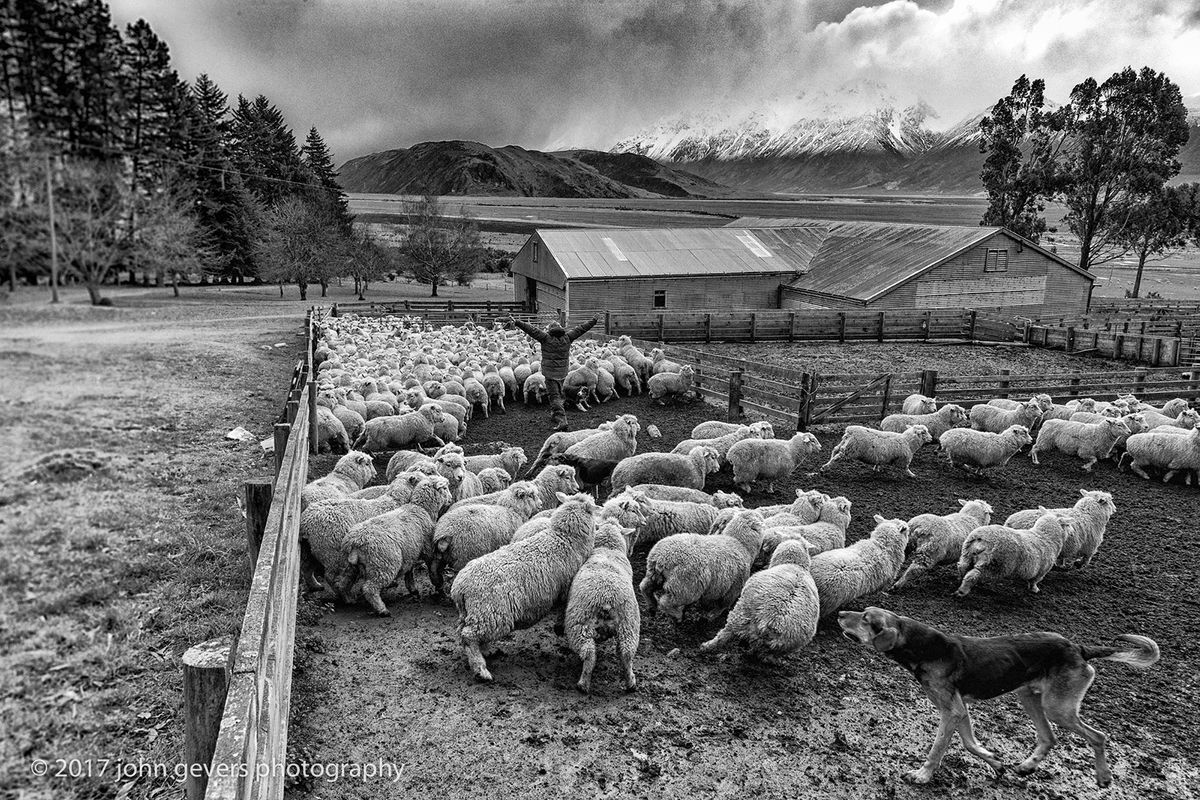
Mark is just arriving back to the house after morning chores and BJ is putting together lunch. We did not establish what time we were arriving and we know she must be away to attend a funeral out of town later in the day. Still, the mother of one-year-old Charlotte (Charlie) and three-year-old Ben doesn’t miss a beat in enlarging the quantity of lunch to include two photographers with American accents.
Soon, the six of us take our seats at a large wooden table on the front porch outside and BJ serves delicious tomato and pasta soup with generously buttered bread. It’s maybe 10°C (50°F) out. The sun is warming and the view towards the Alps is Heidi-rific. Charlie sits in a highchair and proceeds to feed herself, having a high time with what her mom provides her — both eating some and smearing the rest. Some things are universal no matter what culture you’re in. Ben is quite content to eat quietly while listening to his folks talk with these men with strange ways of talking. Men who couldn’t even get across the river without grandpa’s help!
As current politics — both Kiwi and American — are discussed and shuddered over and soup gives way to tea and biscuits, the ever-shifting weather of the Gorge brings in rainclouds.
“Well, we best get to the drenching before we get wet,” Mark leans into his afternoon chore with the momentum of a farmer who knows he’s gotta do what he’s gotta do. Soon boots go on, hats and coats are donned, and we all head out to a fenced paddock where 400 head of sheep were brought in before our arrival.
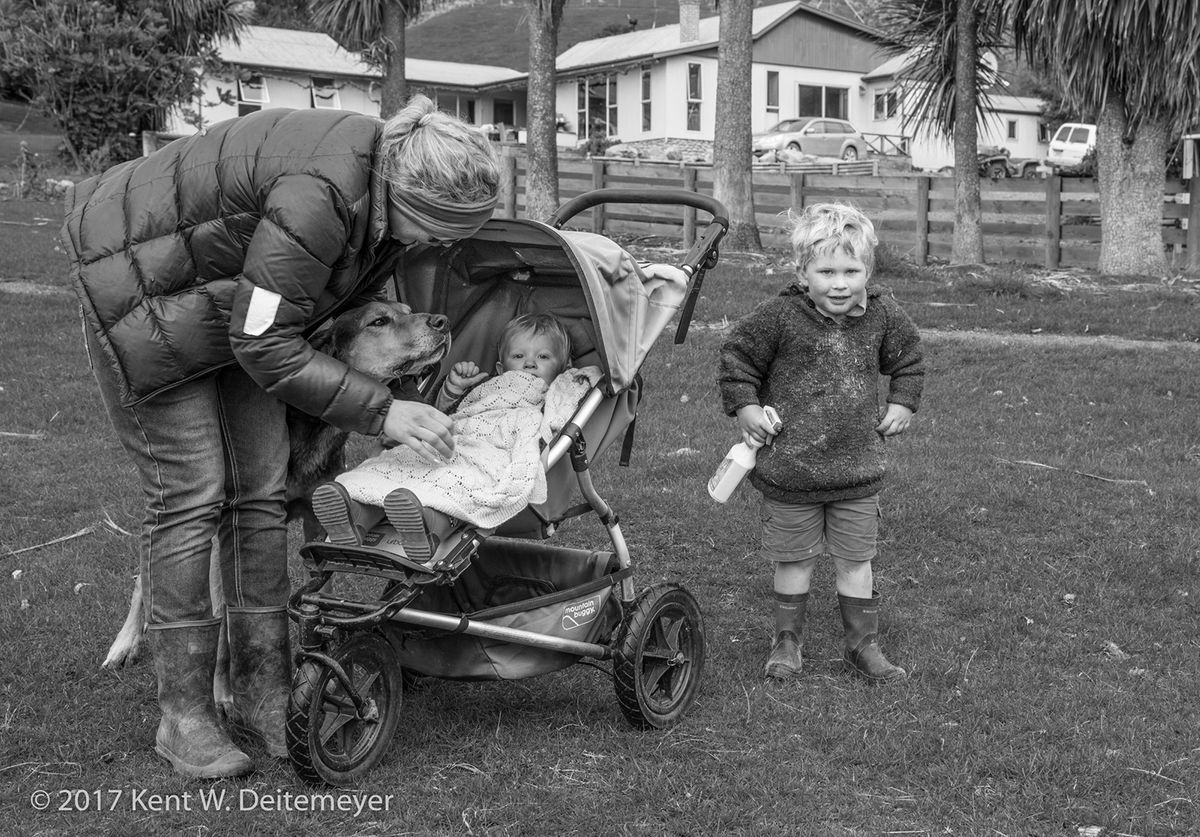
Today they each get a squirt of a drench against worms and an injection of B12 and selenium to supplement the grass diet. Working as partners, Mark calls the sheep dogs, “Hip Hop!” into action and corrals about fifty sheep at a time into a small fenced chute where he administers the drench while BJ comes alongside and provides the injections. This 2000-acre station has no hired help on a day-to-day basis. Mark and BJ handle it all in stride, and Ben and Charlie are right there, too, happy to be part of the action — or watching it all from a pram in Charlie’s case.
The clouds that moved into the valley while we were souping and chatting now begin to let loose, but a little rain doesn’t make anyone run for shelter. The work continues, unfazed by the ever-changing Alpine conditions. BJ checks on Charlie in her pram, drawing a blanket over the wee one and refitting a gumboot onto her bare left foot. Charlie herself had kicked it off a bit earlier.
BJ returns to her work and within a minute Charlie has shed the blanket and boot again, preferring to enjoy the elements exactly as the rest of us are. This is real life on a high country sheep station in New Zealand and even a one-year-old seems to understand the beauty of embracing the fullness of the earth and its bounty.
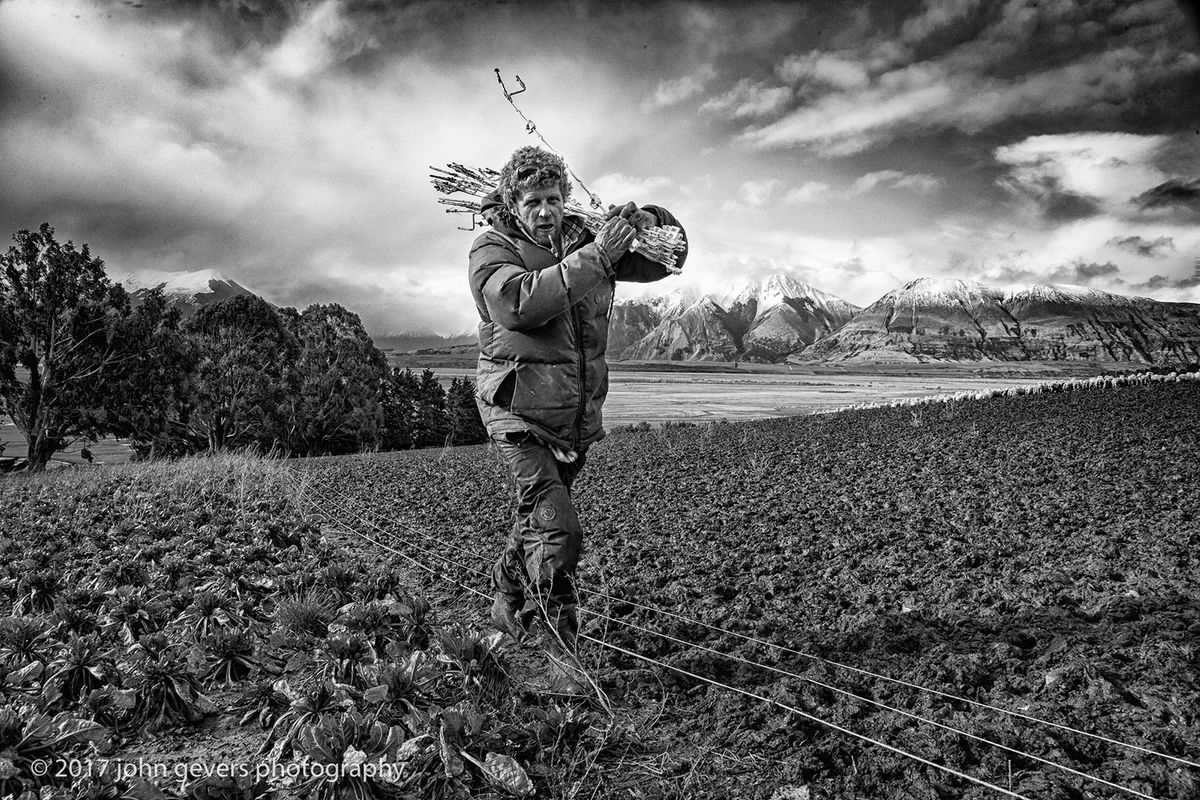
The rain diminishes as the sheep drenching winds down and we join Mark on a steep 4x4 climb (not ours which is still down below, stranded on the other side of the river) to the upper reaches of his farm at about 1500 feet. He’s contemplating adding a one-bedroom batch up there for a bit of a special treat for tourists wanting to both getaway from it all and get back to basics in such a remote, stellar part of his world. Sheep farming doesn’t bring in the money like it once did in New Zealand, and all farmers are faced with the realities of markets, making ends meet, and remaining sustainable. Few know these facts better than university graduate-turned fulltime farmer Mark Ensor. He waxes on about his field of economics while pulling up a run of electric fencing as his dog Pip keeps the sheep in line before the farmer is ready for the flock to be moved into fresh pasture.
As the last of the portable fencing is removed and hoisted up back to the sport ute, the rain starts again. Mark whistles Pip into action, “Hip Hop!” and other commands, and soon another part of Mark’s flock has fresh fodder and we all head back to the farmstead. BJ’s back cleaning up the lunch dishes and preparing to make her funeral descent into Christchurch and on to Gore where her aunt has died. For a few days while mom is away, Mark will be the primary, um, shepherd, of his flock — to include his progeny. No worries there: at Glenariffe, life is as real and rich and good as it comes. We can’t help but wonder whether Ben and Charlie might grow up to become yet another generation of Ensors keeping the high country station afloat.
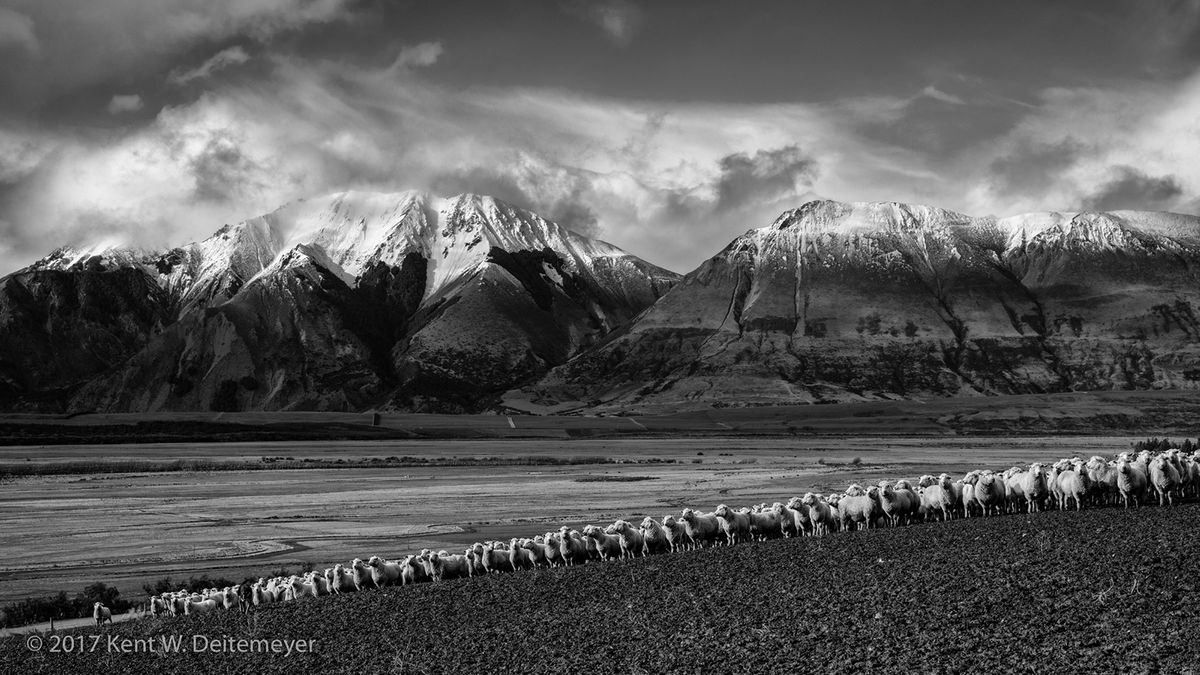

Find us on Facebook @stewardsoftheheartlands